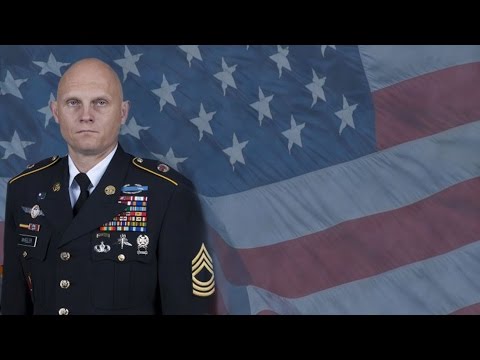
In a tiny trailer near the eastern Oklahoma border, Joshua L. Wheeler played a central role in raising his five younger siblings. He’d cook them breakfast, work odd jobs to bring in extra money, and even fasten his little’s sister’s hair in ponytails before school. The experience helped shape him as a man who was comfortable with significant amounts of responsibility, family members said.
It is these gentle memories that both conflict with and bolster stories about the man Wheeler would become. From Oklahoma’s rural Sequoyah County, he would go on to be an Army Ranger, a veteran of the wars in Iraq and Afghanistan and a member of the Army’s elite Delta Force, a secretive counterterrorism force first established in the late 1970s.
On Oct. 22, he was killed in combat, the first U.S. service member to die in the military campaign against the Islamic State group, after getting hit with small-arms fire during a raid carried out with Kurdish forces on a militant-run prison in Hawijah, Iraq. The mission freed some 70 prisoners who U.S. officials believe would have been executed and dumped in a mass grave later that day.
Wheeler’s death prompted questions about whether U.S. officials can accurately claim that U.S. troops do not have a combat role in Iraq.
But on a searing, personal level, it also affected members of a tight-knit family that stretches from the mountainous Cherokee lands of northern Oklahoma to the quiet woodlands of North Carolina. Among those he left behind are his wife, Ashley, their infant son and three older sons from a previous marriage.
“I find myself saying, ‘What would Josh do?'” said Tatira Wade, a sister of Wheeler’s who lives in Arkansas. “I really thought my brother was invincible. He was like my Superman. Memorial Day has a whole new meaning for me now.”
Two other U.S. service members – Marine Staff Sgt. Louis F. Cardin, 27, and Navy Special Warfare Operator 1st Class Charles H. Keating IV, 31 – have been killed in Iraq since Wheeler. Eleven more U.S. troops and a civilian Defense Department employee have been killed in action in Afghanistan since the U.S. military shifted to a support mission there at the beginning of 2015, according to Pentagon statistics.
The marking of Wheeler’s death began in the United States with the arrival of his remains on a C-17 cargo jet at Dover Air Force Base, Del., two days after his death. Defense Secretary Ashton B. Carter and Army Chief of Staff Gen. Mark A. Milley, both on the job less than a year, stood at attention in the sunshine as his flag-draped “transfer case” was carried by grim-faced U.S. soldiers from the plane to a waiting van nearby.
A month later, Wheeler was buried at Arlington National Cemetery in a ceremony that was closed to the media – hardly a surprise, considering the nature of his unit. The Army does not disclose who is in Delta Force, known formally as 1st Special Forces Operational Detachment-Delta, but military officials confirmed after Wheeler’s death that he was part of it.
Other memorial services were held in North Carolina, where Wheeler lived, and in the Oklahoma town of Muldrow, where he attended high school and played football. And on Thursday, U.S. Army Special Operations Command added the name of Wheeler and two other soldiers who were killed in Afghanistan in the last year – 1st Sgt. Peter A. McKenna, Jr., and Sgt. 1st Class Matthew Q. McClintock – to a smooth, black memorial wall outside the unit’s headquarters at Fort Bragg, N.C., and rang a bell to recognize their loss.
Members of the Wheeler family traveled from Oklahoma to attend, and were struck by how the service seemed design not only to honor the fallen soldiers, but them as well.
“What they did was amazing. The way they’ve been with us so far has been amazing,” said Heather Quackenbush, another of Wheeler’s sisters. “To me, they have literally helped me grieve – and that’s a lot.”
Quackenbush said that when she and her siblings were young, it was Josh that no one ever wanted to disappoint. Their mother was single for much of their childhood, and they spent the majority of their time playing outside in the trees in the five acres surrounding the family home with the oldest brother watching out for them.
In more recent years, they might go six months at a time without being able to talk to him because of his deployments – but when he’d return home, he always was able to spot problems in the family and work on them, she said.
Wade said that when she was younger, she grew upset after learning that her brother had re-enlisted to stay in the Army. He told her that him being away “was part of him growing up,” she said.
“But he told me would always be there for me and he would always come visit,” she added, noting that he was planning to do so earlier this year.
Wheeler’s brothers and sisters knew nothing about his life in one of America’s most highly trained and deadly units – but they’re in awe of it now.
“When I heard my brother actually did this stuff, I was like ‘Wow,'” Wade said. “Don’t get me wrong. I knew he was doing some sort of special ops and it was dangerous. But as far as knowing exactly what he did? No. And he would never talk about it.”
(c) 2016, The Washington Post · Dan Lamothe

